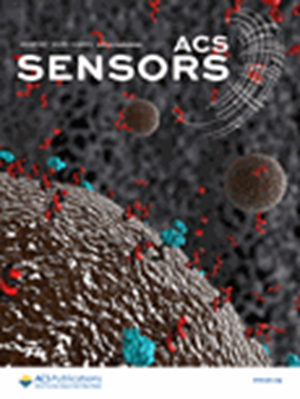用于组织界面软生化传感的电化学活性材料
IF 8.2
1区 化学
Q1 CHEMISTRY, ANALYTICAL
引用次数: 0
摘要
组织界面软生化传感是个性化医疗保健的重要途径,它采用电化学活性材料实时监测组织界面的生化信号,无论是无创还是通过植入。这些软性生化传感器可以与各种生物组织集成,如神经、胃肠道、眼、心脏、皮肤、肌肉和骨骼,以适应其独特的机械和生化环境。采用导电聚合物、复合材料、金属、金属氧化物和碳基纳米材料等材料的传感器已经在诸如连续血糖监测、神经活动测绘和实时代谢物检测等应用中证明了其能力,从而增强了一系列医疗领域的诊断和治疗监测。下一代组织接口生物传感器可以实现多模式和多路测量生化标记和生理参数,这可能对个性化医疗产生革命性影响,允许对个人健康状况进行高分辨率、时间分辨率的历史监测。在这篇综述中,我们总结了该领域的当前趋势,以提供对组织界面软生化传感器的挑战和未来发展轨迹的见解,强调了它们在彻底改变个性化医疗和改善患者预后方面的潜力。本文章由计算机程序翻译,如有差异,请以英文原文为准。

Electrochemically Active Materials for Tissue-Interfaced Soft Biochemical Sensing
Tissue-interfaced soft biochemical sensing represents a crucial approach to personalized healthcare by employing electrochemically active materials to monitor biochemical signals at the tissue interface in real time, either noninvasively or through implantation. These soft biochemical sensors can be integrated with various biological tissues, such as neural, gastrointestinal, ocular, cardiac, skin, muscle, and bone, adapting to their unique mechanical and biochemical environments. Sensors employing materials like conductive polymers, composites, metals, metal oxides, and carbon-based nanomaterials have demonstrated capabilities in applications, such as continuous glucose monitoring, neural activity mapping, and real-time metabolite detection, enhancing diagnostics and treatment monitoring across a range of medical fields. Next-generation tissue-interfaced biosensors that enable multimodal and multiplexed measurement of biochemical markers and physiological parameters could be transformative for personalized medicine, allowing for high-resolution, time-resolved historical monitoring of an individual’s health status. In this review, we summarize current trends in the field to provide insights into the challenges and future trajectory of tissue-interfaced soft biochemical sensors, highlighting their potential to revolutionize personalized medicine and improve patient outcomes.
求助全文
通过发布文献求助,成功后即可免费获取论文全文。
去求助
来源期刊

ACS Sensors
Chemical Engineering-Bioengineering
CiteScore
14.50
自引率
3.40%
发文量
372
期刊介绍:
ACS Sensors is a peer-reviewed research journal that focuses on the dissemination of new and original knowledge in the field of sensor science, particularly those that selectively sense chemical or biological species or processes. The journal covers a broad range of topics, including but not limited to biosensors, chemical sensors, gas sensors, intracellular sensors, single molecule sensors, cell chips, and microfluidic devices. It aims to publish articles that address conceptual advances in sensing technology applicable to various types of analytes or application papers that report on the use of existing sensing concepts in new ways or for new analytes.
 求助内容:
求助内容: 应助结果提醒方式:
应助结果提醒方式:


